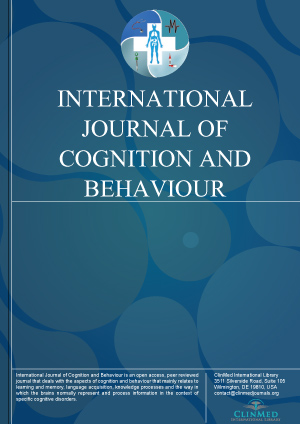Open Access DOI:10.23937/2690-3172/1710010
Chiasmus as an Alternative Pattern of Teaching
Dhouha Bacha, Wael Ferjaoui, Lasaad Gharbi, Sana Ben Slama and Ahlem Lahmar
Article Type: Editorial | First Published: October 15, 2020
Etymologically the word chiasm comes from the Greek word khiasmós which means crossing. The chiasm construction is a repetition crossing 2 segments A-B around a center C creating an AB/C/BA structure. This is a rhetorical figure of speech expressing repetition. In linguistics, the purpose of repetition is the emphasis on the message to be conveyed. In pedagogy, the 3 goals of repetition are: Consolidation, deepening and feedback. In the domain of procedural knowledge, repetition makes it possib...
Open Access DOI:10.23937/2690-3172/1710009
Cognitive Behaviour Assessment in Chronic Non Specific Low Back Pain: A Narrative Review
Seema Saini, Paresh Golwala, M.S., Lata Parmar, PhD, Devashish Tiwari, PhD, and Tushar J Palekar, PhD
Article Type: Research Article | First Published: October 15, 2020
Literature showed that patients with Chronic Low Back Pain (CLBP) have slowed speeds of information processing and working memory. Methods for assessment of cognition behaviour are decisive for the implementation Of Cognitive behavioural therapies. There remains a large component of the adherence process not assessed, while treating non specific chronic Low back Pain, and the known role for treatment appraisals and beliefs necessitating the pursuit of improved assessment methods. The purpose of ...
Open Access DOI:10.23937/2690-3172/1710008
Mood Induction Can Enhance Cognitive Remediation in Depression
Meenakshi Banerjee and Keshav Kumar
Article Type: Case Report | First Published: October 01, 2020
Individuals suffering from Major Depressive Disorder (MDD) and those who are vulnerable to depression show biases in attention, memory, and interpretation. These individuals are likely to focus attention on and also tend to remember mood-congruent information. They are also likely to interpret uncertain scenarios in a negative manner. On the whole, these biases are known to affect their ability to interpret an emotional situation predominantly in a negative manner, which later develops into an e...
Open Access DOI:10.23937/2690-3172/1710007
Neurophysiological Signature of Memory Performance during the DRM Task
Grégoire Favre, Sibylle K Horat, François R Herrmann, Isabelle Gothuey, Marco CG Merlo and Pascal Missonnier
Article Type: Original Article | First Published: July 31, 2020
The Deese-Roediger-McDermott (DRM) task is a typical experimental paradigm used to induce false memory production. Previous investigations using event-related potentials (ERPs) revealed differences in a late negative component, FN400, in healthy subjects performing the DRM. However, false memory production may be related to the earlier engagement of cortical circuits. To date, there is no study exploring the electrophysiological activation of early and late neural networks DRM-related in healthy...
Open Access DOI:10.23937/2690-3172/1710006
Bio-Psychologically Based Resilience Traits in a Group of Healthy Undergraduate Students: The Role of NRG1 Gene
Zsuzsanna Elek, Zsolt Rónai, János Réthelyi, Enikő Csilla Kiss, István Tiringer, Ernő Hupuczi, László Martin, János Kállai
Article Type: Research Article | First Published: July 25, 2020
The genetic predisposition for the psychological resilience has an essential role in the phenotype of adaptive and successful behavior, but the functional repertoire of bio-psychological bases for the adaptive personality growth is until uncompleted. Besides dopaminergic and serotoninergic system-related genes is required to reveal a new genetic target for understanding the potential biological mechanism of resilience. The object of this study was to examine the role of different genetic polymor...
Open Access DOI:10.23937/2690-3172/1710005
Intellectual Disability and its Association with Care Givers Burden at Sasaram
Upendra Singh, Sweta and Bhupendra Singh
Article Type: Original Article | First Published: April 20, 2020
Cross sectional hospital based technique was used for the study. Total 98 children with intellectual disability along with their caregivers were recruited through systematic sampling from outpatient department of District Mental Health Program Unit (DMHP), District Hospital, of Bihar. Informed consent was sought from the participants and structured socio-demographic data sheet and family burden interview schedule was administered....

